Two years ago I wrote about the Top 10 Ways Seattle Kicks San Francisco’s Ass – which sparked much comment from my native city! I cited San Francisco’s rising cost of living yet decreasing livability (not to mention a vastly inferior football franchise) as just a few of the reasons why Seattle continues to rock. Since 2015, it seems like a lot of people took my arguments to heart and chose Seattle over San Francisco. So this week, I’m revisiting a few more reasons that Seattle is the best tech center and city on the West Coast, for investors and residents alike:
- Seattle is more attractive to high-wage tech employers
- It’s (somehow) still more affordable to live here
- Seattle is cheaper for businesses
- Capital & investors continue following talent to Seattle
- Seattle’s quality of life simply offers more
Want to understand the story behind the trend?
1. Seattle is more attractive to high-wage tech employers
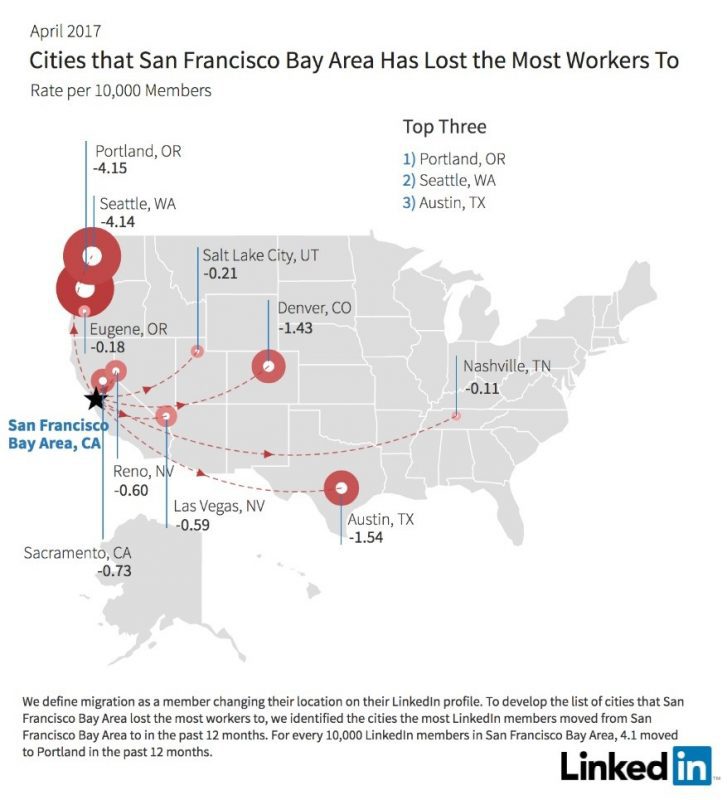
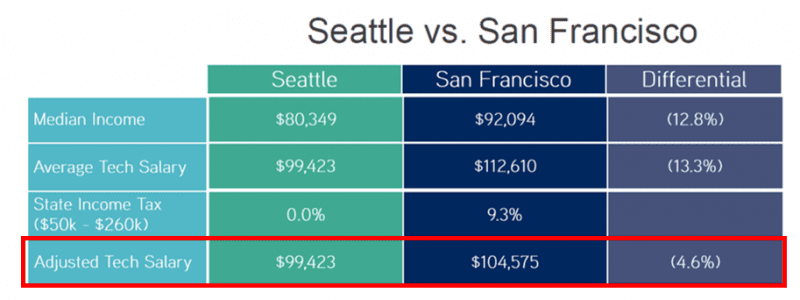
Are you dreaming of a life in theater, move to New York. Are you an aspiring movie star, move to Los Angeles. And for years, if you wanted a career in tech, you moved to the San Francisco / Bay Area. That trend is rapidly changing. LinkedIn’s monthly Workforce Reports reveal that Seattle is one of the top three beneficiaries of San Francisco employees looking to move, and according to the WA Department of Licensing, California is the top state residents are moving from. This northward tech migration makes sense when you break down the numbers: San Francisco residents may have higher median incomes and tech salaries, but the state’s income tax nullifies most of the differential. When faced with a prohibitive cost of living (double for housing alone!), the 4.6% differential isn’t enough to keep people in the Bay Area.
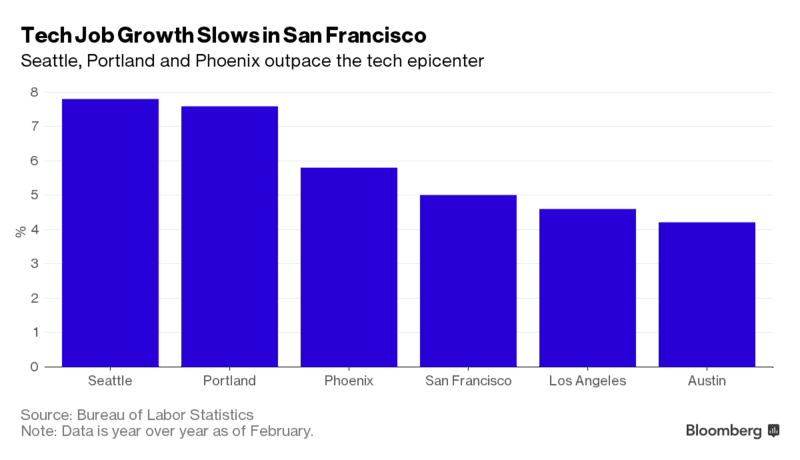
Our tech boom is picking up steam, while San Francisco’s bubble is close to breaking. In the next few years, the line will be: if you want a great tech job, move to Seattle.
2. It’s (somehow) still more affordable to live here
While Seattleites have justifiable reasons to complain about the rising rents and even faster-rising home prices, the Evergreen City is still a cheaper place to live than San Francisco. According to Zillow’s latest research on housing prices, the average price for a home in Seattle is $420,200, while in San Francisco the average price is a whopping $839,600! Rents follow a similar trendline: Zillow reports Seattle’s average rent as $2,100, while San Francisco’s average rent is $3,354. Seattle is doing its best to catch up to San Francisco’s soaring prices, but in the meantime, our city still offers more affordable housing options for residents who want to live in a growing, tech-oriented coastal city. Seattle is better for non-tech workers, too: a recent study from Trulia revealed that San Francisco isn’t even affordable for doctors anymore, and only 0.4% of teachers can afford to live in the city.
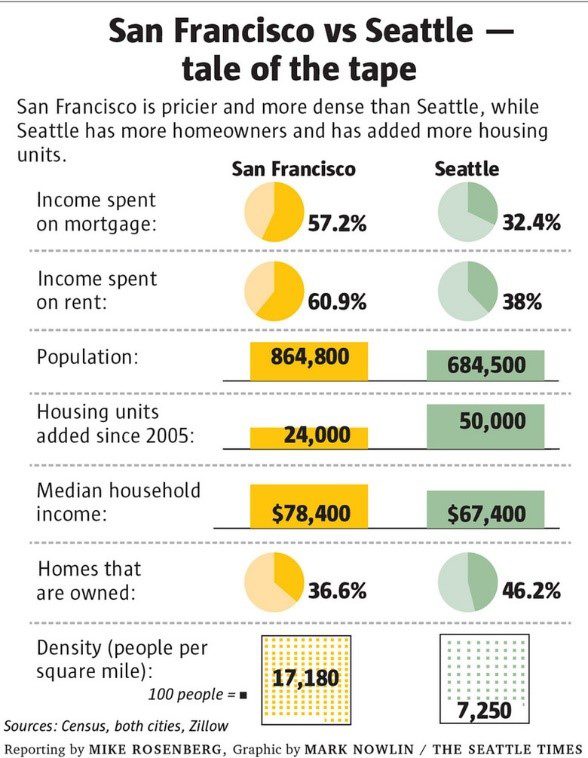
Affordable housing will determine the fates of these two cities, and it’s not looking good for San Francisco… especially when doctors can’t afford to live there! Seattle’s efforts to incorporate affordable housing options into core neighborhoods may frustrate developers in the short-term, but in the long run our solutions to affordable housing are considerably more market driven than SF, or even Portland.
3. Seattle is cheaper for businesses

When GeekWire recently interviewed DocuSign founder Ton Gonser, he cited Seattle’s low office rents as one of the driving factors for the company opening a second office here: “It would be difficult to start a company in [San Francisco] because your cost of office space and salaries is going to be massively high and you’re going to have longer commutes,” said Gonser. He’s absolutely right, and he’s not the only business executive doing the math. Seattle’s average lease rate is about $34.60, while in San Francisco the average is $73.65. Seattle’s lower office lease rates are attracting big-name companies like Facebook, Google, Expedia, and Twitter who are claiming office space in the city like they’re pilgrims in the wild west. The lower office costs don’t just benefit the big fish here. The lower cost to start a business attracts entrepreneurs and startups to the city, too. Seattle has had the largest increase in high-tech startups between 1990 and 2010, and the University of Washington’s increased focus on fostering startups is promising for the next 10 years. As an additional consideration, once you have the great employees you need to retain them – and yes millennials will eventually buy homes and have children. Not every employee can afford a home in the $1M range, yet in Seattle you don’t have to look too far outside downtown to find a house for half of that amount.
4. Capital & investors continue following talent to Seattle
As high-profile tech companies and new startups rush into Seattle’s market, venture capital funding and investors are following in lock-step. VC funding in Seattle is steadily increasing, even if we’re still far behind San Francisco for total VC investments.
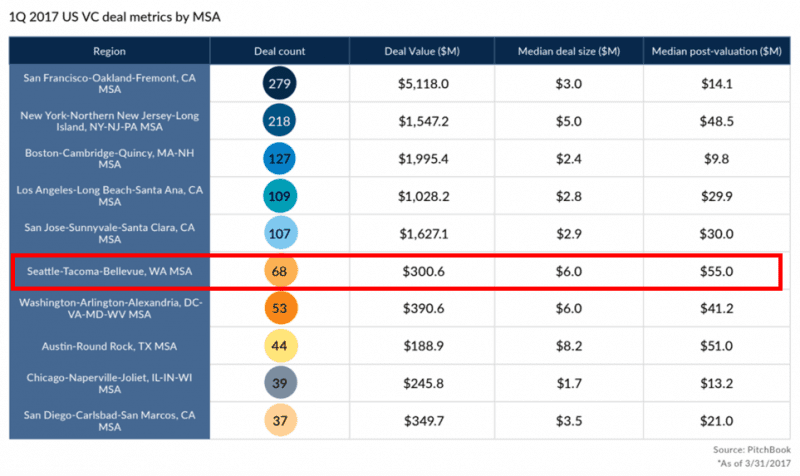
Yet Seattle is already a popular secondary market for international and domestic investors, and in 2016 it surpassed Boston in cumulative domestic investments as well as total investments:
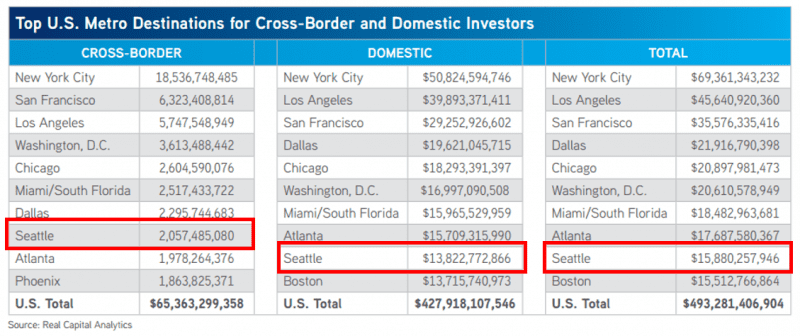
Until recently, Seattle wasn’t considered a “top-tier” market for either domestic or foreign real estate investment. Such status is quickly changing. Investors across the United States and abroad are hustling to have a piece of Seattle in their portfolio. This is not news to many, yet as Seattle inches is way closer to a Top 5 position, the tide of popularity will soon move towards a prevailing viewpoint of stability. And stability as a global investment market increases asset values for all players.
5. Seattle’s quality of life simply offers more
Mountain lakes abutting Amazon’s Global Headquarters.
Kayak from downtown to your local brewery.
Wine country in 20 minutes.
Skiing in 45 minutes.
Match that San Francisco!

